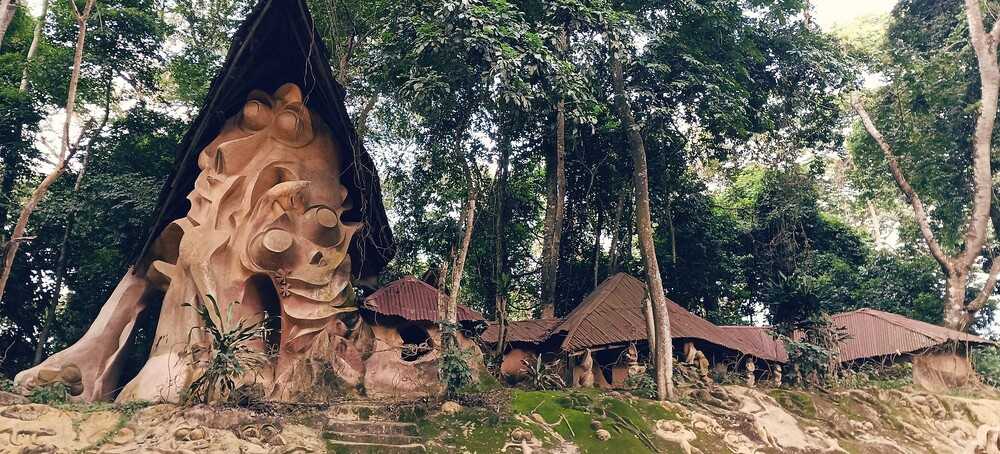Nigeria - NG - NGA - NGR - Africa
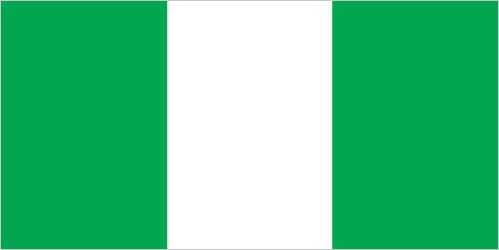
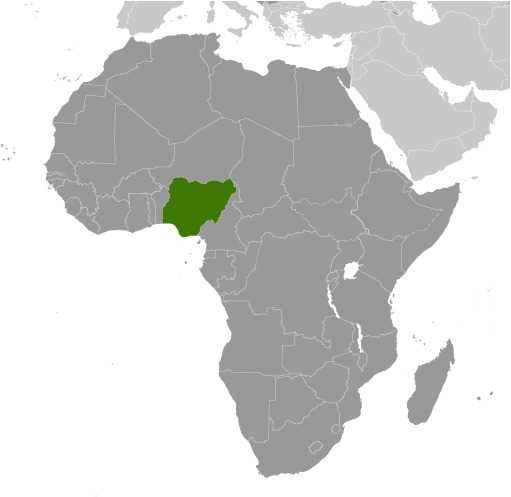
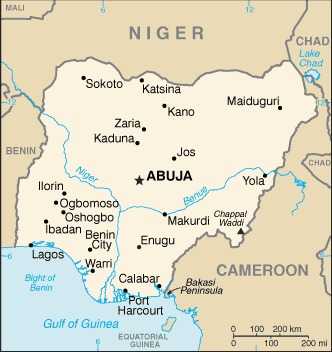
Nigeria Images
Nigeria Factbook Data
Diplomatic representation from the US
embassy: Plot 1075 Diplomatic Drive, Central District Area, Abuja
mailing address: 8320 Abuja Place, Washington DC 20521-8320
telephone: [234] (9) 461-4000
FAX: [234] (9) 461-4036
email address and website:
AbujaACS@state.gov
https://ng.usembassy.gov/
consulate(s) general: Lagos
Age structure
15-64 years: 56.2% (male 66,897,900/female 66,187,584)
65 years and over: 3.4% (2024 est.) (male 3,759,943/female 4,274,287)
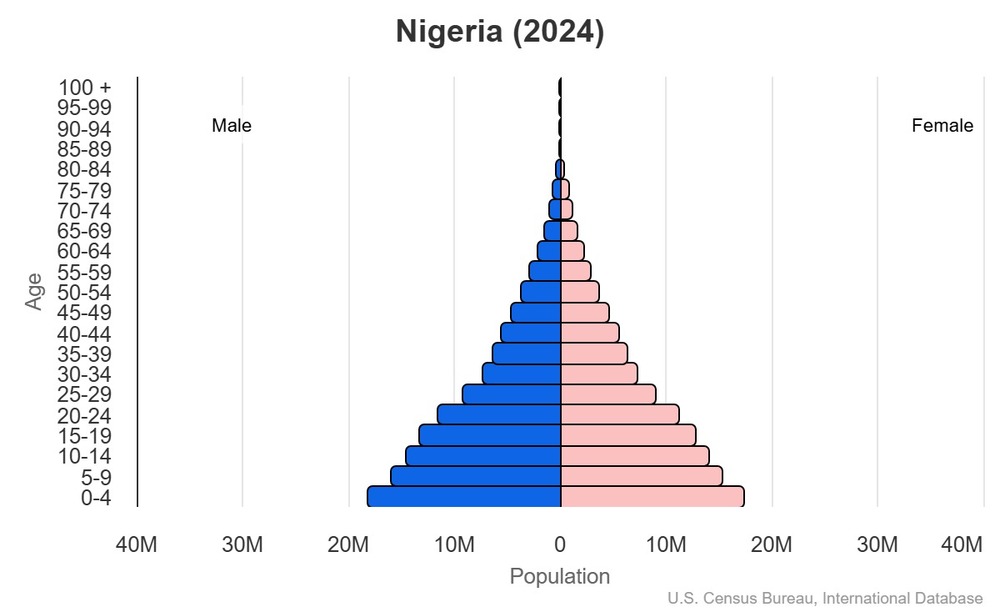
For additional information, please see the entry for Population pyramid on the Definitions and Notes page.
Geographic coordinates
Sex ratio
0-14 years: 1.04 male(s)/female
15-64 years: 1.01 male(s)/female
65 years and over: 0.88 male(s)/female
total population: 1.02 male(s)/female (2024 est.)
Natural hazards
Area - comparative
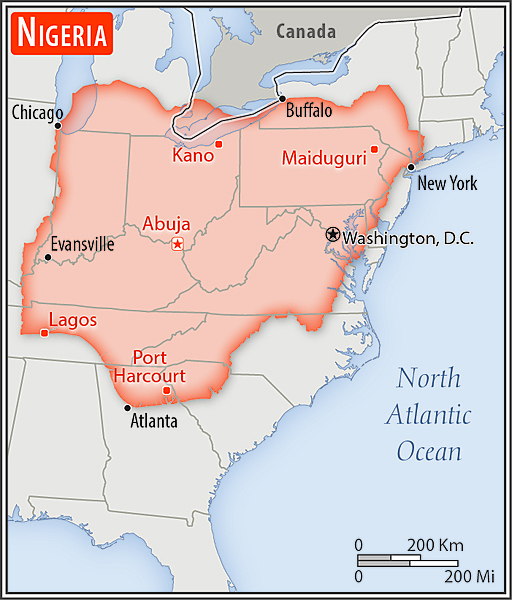
about six times the size of Georgia; slightly more than twice the size of California
Military service age and obligation
Background
In ancient and pre-colonial times, the area of present-day Nigeria was occupied by a variety of ethnic groups with different languages and traditions. These included large Islamic kingdoms such as Borno, Kano, and the Sokoto Caliphate dominating the north, the Benin and Oyo Empires that controlled much of modern western Nigeria, and more decentralized political entities and city states in the south and southeast. In 1914, the British amalgamated their separately administered northern and southern territories into a Colony and Protectorate of Nigeria.
Nigeria achieved independence from Britain in 1960 and transitioned to a federal republic with three constituent states in 1963 under President Nnamdi AZIKIWE. This structure served to enflame regional and ethnic tension, contributing to a bloody coup led by predominately southeastern military officers in 1966 and a countercoup later that year masterminded by northern officers. In the aftermath of this tension, the governor of Nigeria’s Eastern Region, centered on the southeast, declared the region independent as the Republic of Biafra. The ensuring civil war (1967-1970), resulted in more than a million deaths, many from starvation. While the war forged a stronger Nigerian state and national identity, it contributed to long-lasting mistrust of the southeast’s predominantly Igbo population. Wartime military leader Yakubu GOWON ruled until a bloodless coup by frustrated junior officers in 1975. This generation of officers, including Olusegun OBASANJO, Ibrahim BABANGIDA, and Muhammadu BUHARI, who would all later serve as president, continue to exert significant influence in Nigeria to the present day.
Military rule predominated until the first durable transition to civilian government and adoption of a new constitution in 1999. The elections of 2007 marked the first civilian-to-civilian transfer of power in the country's history. National and state elections in 2011 and 2015 were generally regarded as credible. The 2015 election was also heralded for the fact that the then-umbrella opposition party, the All Progressives Congress, defeated the long-ruling (since 1999) People's Democratic Party and assumed the presidency, marking the first peaceful transfer of power from one party to another. Presidential and legislative elections in 2019 and 2023 were deemed broadly free and fair despite voting irregularities, intimidation, and violence. The government of Africa's most populous nation continues to face the daunting task of institutionalizing democracy and reforming a petroleum-based economy whose revenues have been squandered through decades of corruption and mismanagement. In addition, Nigeria faces increasing violence from Islamic terrorism, largely in the northeast, large scale criminal banditry, secessionist violence in the southeast, and competition over land and resources nationwide.
Environmental issues
International environmental agreements
signed, but not ratified: Tropical Timber 2006
Military expenditures
0.7% of GDP (2023 est.)
0.6% of GDP (2022 est.)
0.6% of GDP (2021 est.)
0.6% of GDP (2020 est.)
Population below poverty line
note: % of population with income below national poverty line
Household income or consumption by percentage share
highest 10%: 26.7% (2018 est.)
note: % share of income accruing to lowest and highest 10% of population
Exports - commodities
note: top five export commodities based on value in dollars
Exports - partners
note: top five export partners based on percentage share of exports
Administrative divisions
Agricultural products
note: top ten agricultural products based on tonnage
Military and security forces
Ministry of Interior: Nigeria Security and Civil Defense Corps (NSCDC); Ministry of Police Affairs: Nigeria Police Force (NPF) (2025)
note 1: the NSCDC is a paramilitary agency commissioned to assist the military in the management of threats to internal security, including attacks and natural disasters
note 2: some states have created local security forces in response to increased violence, insecurity, and criminality that have exceeded the response capacity of federal government security forces, but official security forces remained the constitutional prerogative of the federal government; in 2023, the federal government began deploying thousands of "agro rangers" across 19 states and the Federal Capital Territory to help safeguard farmland and mediate conflicts, especially in areas hit by farmer-herder clashes
Budget
expenditures: $59.868 billion (2019 est.)
Capital
geographic coordinates: 9 05 N, 7 32 E
time difference: UTC+1 (6 hours ahead of Washington, DC, during Standard Time)
etymology: the newly built city of Abuja replaced Lagos as the capital city in 1991; Abuja takes its name from a nearby town, now renamed Suleja, that was named after Abu JA ("Abu the Red") in 1828
Imports - commodities
note: top five import commodities based on value in dollars
Climate
Coastline
Constitution
amendment process: proposed by the National Assembly; passage requires at least two-thirds majority vote of both houses and approval by the Houses of Assembly of at least two thirds of the states; amendments to constitutional articles on the creation of a new state, fundamental constitutional rights, or constitution-amending procedures requires at least four-fifths majority vote by both houses of the National Assembly and approval by the Houses of Assembly in at least two thirds of the states; passage of amendments limited to the creation of a new state require at least two-thirds majority vote by the proposing National Assembly house and approval by the Houses of Assembly in two thirds of the states
Exchange rates
Exchange rates:
1,478.965 (2024 est.)
645.194 (2023 est.)
425.979 (2022 est.)
401.152 (2021 est.)
358.811 (2020 est.)
Executive branch
head of government: President Bola Ahmed Adekunle TINUBU (since 29 May 2023)
cabinet: Federal Executive Council appointed by the president but constitutionally required to include at least one member from each of the 36 states
election/appointment process: president directly elected by qualified-majority popular vote with at least 25% of the votes cast in 24 of Nigeria's 36 states; president elected for a 4-year term (eligible for a second term)
most recent election date: 25 February 2023
election results:
2023: Bola Ahmed Adekunle TINUBU elected president; percent of vote - Bola Ahmed Adekunle TINUBU (APC) 36.6%, Atiku ABUBAKAR (PDP) 29.1%, Peter OBI (LP) 25.4%, Rabiu KWANKWASO (NNPP) 6.4%, other 2.5%
2019: Muhammadu BUHARI elected president; percent of vote - Muhammadu BUHARI (APC) 53%, Atiku ABUBAKAR (PDP) 39%, other 8%
expected date of next election: 27 February 2027
note: the president is chief of state, head of government, and commander-in-chief of the armed forces
Flag
meaning: green stands for the country's forests and natural resources, and white for peace and unity
Illicit drugs
major precursor-chemical producer (2025)
Independence
Industries
Judicial branch
judge selection and term of office: judges appointed by the president upon the recommendation of the National Judicial Council, a 23-member independent body of federal and state judicial officials; judge appointments confirmed by the Senate; judges serve until age 70
subordinate courts: Court of Appeal; Federal High Court; High Court of the Federal Capital Territory; Sharia Court of Appeal of the Federal Capital Territory; Customary Court of Appeal of the Federal Capital Territory; state court system similar in structure to federal system
Land boundaries
border countries (4): Benin 809 km; Cameroon 1,975 km; Chad 85 km; Niger 1,608 km
Land use
arable land: 40.5% (2023 est.)
permanent crops: 8.1% (2023 est.)
permanent pasture: 27.6% (2023 est.)
forest: 19.1% (2023 est.)
other: 4.7% (2023 est.)
Legal system
Legislative branch
legislative structure: bicameral
Literacy
male: 73.7% (2021 est.)
female: 53.3% (2021 est.)
Maritime claims
exclusive economic zone: 200 nm
continental shelf: 200-m depth or to the depth of exploitation
International organization participation
National holiday
Nationality
adjective: Nigerian
Natural resources
Geography - note
Economic overview
Political parties
Africa Democratic Congress or ADC
All Progressives Congress or APC
All Progressives Grand Alliance or APGA
Labor Party or LP
New Nigeria People’s Party or NNPP
Peoples Democratic Party or PDP
Young Progressive Party or YPP
Railways
standard gauge: 293 km (2014) 1.435-m gauge
narrow gauge: 3,505 km (2014) 1.067-m gauge
note: as of the end of 2018, there were only six operational locomotives in Nigeria primarily used for passenger service; the majority of the rail lines are in a severe state of disrepair and need to be replaced
Suffrage
Terrain
Government type
Country name
conventional short form: Nigeria
etymology: named for the Niger River that flows through the west of the country to the Atlantic Ocean; the name of the river probably comes from the local Tuareg name, egereou n-igereouen (big rivers)
Location
Map references
Irrigated land
Diplomatic representation in the US
chancery: 3519 International Court NW, Washington, DC 20008
telephone: [1] (202) 800-7201 (ext. 100)
FAX: [1] (202) 362-6541
email address and website:
info@nigeriaembassyusa.org
https://www.nigeriaembassyusa.org/
consulate(s) general: Atlanta, New York
Internet users
Internet country code
Refugees and internally displaced persons
IDPs: 3,709,022 (2024 est.)
GDP (official exchange rate)
note: data in current dollars at official exchange rate
Total renewable water resources
Urbanization
rate of urbanization: 3.92% annual rate of change (2020-25 est.)
Broadcast media
Drinking water source
urban: 93.7% of population (2022 est.)
rural: 63.5% of population (2022 est.)
total: 79.6% of population (2022 est.)
unimproved:
urban: 6.3% of population (2022 est.)
rural: 36.5% of population (2022 est.)
total: 20.4% of population (2022 est.)
National anthem(s)
lyrics/music: Lillie Jean WILLIAMS/Frances BERDA
history: adopted 2024
note: Parliament voted in 2024 to revert to the former national anthem used from 1960 to 1978
Major urban areas - population
International law organization participation
Physician density
National symbol(s)
Mother's mean age at first birth
note: data represents median age at first birth among women 25-49
Citizenship
citizenship by descent only: at least one parent must be a citizen of Nigeria
dual citizenship recognized: yes
residency requirement for naturalization: 15 years
Population distribution
Electricity access
electrification - urban areas: 89%
electrification - rural areas: 27%
Civil aircraft registration country code prefix
Sanitation facility access
urban: 81.9% of population (2022 est.)
rural: 41.1% of population (2022 est.)
total: 62.9% of population (2022 est.)
unimproved:
urban: 18.1% of population (2022 est.)
rural: 58.9% of population (2022 est.)
total: 37.1% of population (2022 est.)
Ethnic groups
note: Nigeria, Africa's most populous country, is composed of more than 250 ethnic groups
Religions
Languages
Imports - partners
note: top five import partners based on percentage share of imports
Elevation
lowest point: Atlantic Ocean 0 m
mean elevation: 380 m
Health expenditure
4.3% of national budget (2022 est.)
Military - note
the Nigerian military traces its origins to the Nigeria Regiment of the West African Frontier Force (WAFF), a multi-regiment force formed by the British colonial office in 1900 to garrison Great Britain's West African colonies; the WAFF (the honorary title "Royal" was added later) served in both World Wars; in 1956, the Nigeria Regiment of the Royal WAFF was renamed the Nigerian Military Forces (NMF) and in 1958, the colonial government of Nigeria took over control of the NMF from the British War Office; the Nigerian Armed Forces were established following independence in 1960 (2025)
Military and security service personnel strengths
Military equipment inventories and acquisitions
Military deployments
note: Nigeria has committed an Army combat brigade (approximately 3,000 troops) to the Multinational Joint Task Force (MNJTF), a regional counter-terrorism force comprised of troops from Benin, Cameroon, Chad, and Niger; MNJTF conducts operations against Boko Haram and other terrorist groups operating in the general area of the Lake Chad Basin and along Nigeria's northeast border; national MNJTF troop contingents are deployed within their own country territories, although cross‐border operations are conducted periodically
Terrorist group(s)
note: details about the history, aims, leadership, organization, areas of operation, tactics, targets, weapons, size, and sources of support of the group(s) appear(s) in the Terrorism reference guide
Total water withdrawal
industrial: 1.965 billion cubic meters (2022 est.)
agricultural: 5.51 billion cubic meters (2022 est.)
Waste and recycling
percent of municipal solid waste recycled: 4.7% (2022 est.)
Average household expenditures
on alcohol and tobacco: 0.9% of household expenditures (2023 est.)
Major aquifers
Major watersheds (area sq km)
Internal (endorheic basin) drainage: Lake Chad (2,497,738 sq km)
Major lakes (area sq km)
note - area varies by season and year to year
Major rivers (by length in km)
note: [s] after country name indicates river source; [m] after country name indicates river mouth
National heritage
selected World Heritage Site locales: Sukur Cultural Landscape; Osun-Osogbo Sacred Grove
Child marriage
women married by age 18: 30.3% (2021)
men married by age 18: 1.6% (2021)
note: due to prolonged insecurity concerns, some parts of states, including Borno state, were not sampled
Coal
consumption: 1.326 million metric tons (2023 est.)
exports: 17 metric tons (2023 est.)
imports: 600 metric tons (2023 est.)
proven reserves: 2.144 billion metric tons (2023 est.)
Electricity generation sources
solar: 0.2% of total installed capacity (2023 est.)
hydroelectricity: 22.5% of total installed capacity (2023 est.)
biomass and waste: 0.1% of total installed capacity (2023 est.)
Natural gas
consumption: 19.885 billion cubic meters (2023 est.)
exports: 16.324 billion cubic meters (2023 est.)
proven reserves: 5.761 trillion cubic meters (2021 est.)
Petroleum
refined petroleum consumption: 527,000 bbl/day (2023 est.)
crude oil estimated reserves: 36.89 billion barrels (2021 est.)
Gross reproduction rate
Currently married women (ages 15-49)
Remittances
5.4% of GDP (2023 est.)
4.2% of GDP (2022 est.)
note: personal transfers and compensation between resident and non-resident individuals/households/entities
Space program overview
Space agency/agencies
note: NARSDA originated from the National Centre for Remote Sensing, the National Committee on Space Applications (both established in 1987), and the Directorate of Science (established 1993)
Ports
large: 2
medium: 1
small: 1
very small: 24
ports with oil terminals: 23
key ports: Antan Oil Terminal, Bonny, Lagos, Pennington Oil Terminal
Legislative branch - lower chamber
number of seats: 360 (all directly elected)
electoral system: plurality/majority
scope of elections: full renewal
term in office: 4 years
most recent election date: 2/25/2023
parties elected and seats per party: All Progressives Congress (APC) (180); People's Democratic Party (PDP) (116); Labour Party (LP) (35); New Nigeria Peoples Party (NNPP) (19); Other (10)
percentage of women in chamber: 4.2%
expected date of next election: February 2027
Legislative branch - upper chamber
number of seats: 109 (all directly elected)
electoral system: plurality/majority
scope of elections: full renewal
term in office: 4 years
most recent election date: 2/25/2023
parties elected and seats per party: All Progressives Congress (APC) (59); People's Democratic Party (PDP) (36); Labour Party (LP) (8); Other (6)
percentage of women in chamber: 3.7%
expected date of next election: February 2027
National color(s)
Particulate matter emissions
Methane emissions
agriculture: 1,991.9 kt (2019-2021 est.)
waste: 729.4 kt (2019-2021 est.)
other: 362.7 kt (2019-2021 est.)
Key space-program milestones
2007 - first communications satellite (NigSatCom-1) built and launched by China (failed in orbit, 2008)
2011 - first domestically built remote sensing (RS) satellite (NigeriaSat-X) launched by Russia
2019 - inaugurated a geospatial data analysis center
2022 - signed US-led Artemis Accords for space exploration
2023 - first military reconnaissance RS satellite (DelSat-1) launched by China
Labor force
note: number of people ages 15 or older who are employed or seeking work
Youth unemployment rate (ages 15-24)
male: 3.7% (2024 est.)
female: 6.5% (2024 est.)
note: % of labor force ages 15-24 seeking employment
Net migration rate
Median age
male: 19.1 years
female: 19.6 years
Debt - external
note: present value of external debt in current US dollars
Maternal mortality ratio
Reserves of foreign exchange and gold
$32.035 billion (2023 est.)
$35.564 billion (2022 est.)
note: holdings of gold (year-end prices)/foreign exchange/special drawing rights in current dollars
Total fertility rate
Unemployment rate
3.1% (2023 est.)
3.9% (2022 est.)
note: % of labor force seeking employment
Carbon dioxide emissions
from coal and metallurgical coke: 2.962 million metric tonnes of CO2 (2023 est.)
from petroleum and other liquids: 72.425 million metric tonnes of CO2 (2023 est.)
from consumed natural gas: 39.01 million metric tonnes of CO2 (2023 est.)
Area
land: 910,768 sq km
water: 13,000 sq km
Real GDP (purchasing power parity)
$1.275 trillion (2023 est.)
$1.239 trillion (2022 est.)
note: data in 2021 dollars
Airports
Infant mortality rate
male: 58.9 deaths/1,000 live births
female: 48.2 deaths/1,000 live births
Gini Index coefficient - distribution of family income
note: index (0-100) of income distribution; higher values represent greater inequality
Inflation rate (consumer prices)
24.7% (2023 est.)
18.8% (2022 est.)
note: annual % change based on consumer prices
Current account balance
$6.423 billion (2023 est.)
$1.019 billion (2022 est.)
note: balance of payments - net trade and primary/secondary income in current dollars
Real GDP per capita
$5,600 (2023 est.)
$5,600 (2022 est.)
note: data in 2021 dollars
Broadband - fixed subscriptions
subscriptions per 100 inhabitants: (2023 est.) less than 1
Tobacco use
male: 4.8% (2025 est.)
female: 0.3% (2025 est.)
Obesity - adult prevalence rate
Energy consumption per capita
Death rate
Birth rate
Electricity
consumption: 34.135 billion kWh (2023 est.)
exports: 2.4 billion kWh (2023 est.)
transmission/distribution losses: 5.974 billion kWh (2023 est.)
Merchant marine
by type: general cargo 23, oil tanker 128, other 777
Children under the age of 5 years underweight
Imports
$65.423 billion (2023 est.)
$77.049 billion (2022 est.)
note: balance of payments - imports of goods and services in current dollars
Exports
$60.261 billion (2023 est.)
$69.091 billion (2022 est.)
note: balance of payments - exports of goods and services in current dollars
Heliports
Alcohol consumption per capita
beer: 0.73 liters of pure alcohol (2019 est.)
wine: 0.09 liters of pure alcohol (2019 est.)
spirits: 0.4 liters of pure alcohol (2019 est.)
other alcohols: 3.27 liters of pure alcohol (2019 est.)
Life expectancy at birth
male: 60.4 years
female: 64.2 years
Real GDP growth rate
2.9% (2023 est.)
3.3% (2022 est.)
note: annual GDP % growth based on constant local currency
Industrial production growth rate
note: annual % change in industrial value added based on constant local currency
GDP - composition, by sector of origin
industry: 29.6% (2024 est.)
services: 47% (2024 est.)
note: figures may not total 100% due to non-allocated consumption not captured in sector-reported data
Education expenditure
3% national budget (2024 est.)
Population growth rate
Telephones - mobile cellular
subscriptions per 100 inhabitants: 71 (2024 est.)
Dependency ratios
youth dependency ratio: 72.2 (2025 est.)
elderly dependency ratio: 5.9 (2025 est.)
potential support ratio: 17 (2025 est.)
Population
male: 123,511,557
female: 120,832,508
Telephones - fixed lines
subscriptions per 100 inhabitants: (2024 est.) less than 1
